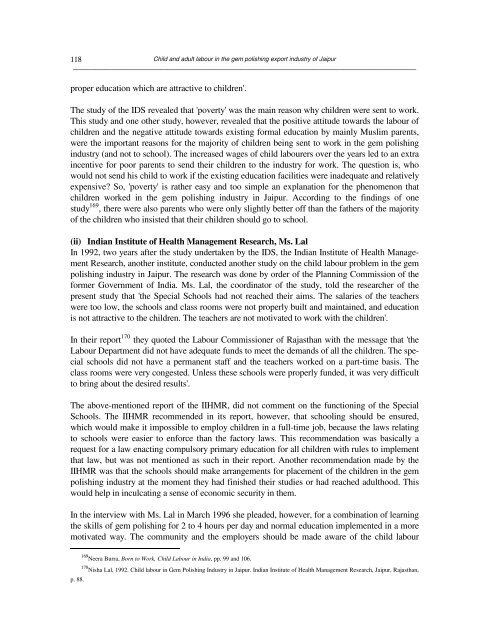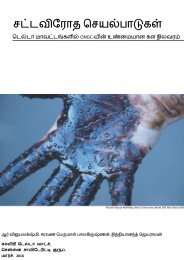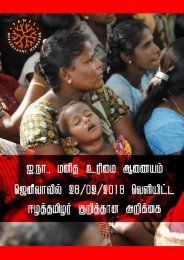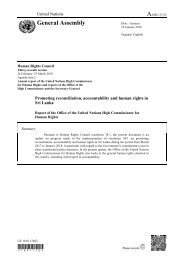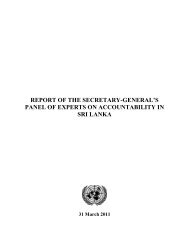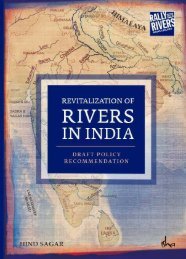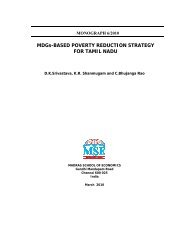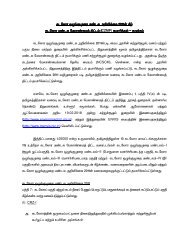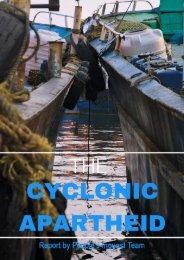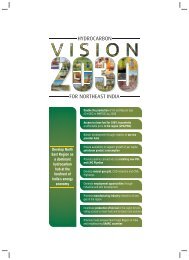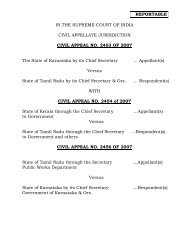Create successful ePaper yourself
Turn your PDF publications into a flip-book with our unique Google optimized e-Paper software.
118<br />
<strong>Child</strong> <strong>and</strong> <strong>adult</strong> <strong>labour</strong> <strong>in</strong> <strong>the</strong> <strong>gem</strong> polish<strong>in</strong>g <strong>export</strong> <strong>in</strong>dustry <strong>of</strong> Jaipur<br />
──────────────────────────────────────────────────────────────────────────────────────────────<br />
proper education which are attractive to children'.<br />
The study <strong>of</strong> <strong>the</strong> IDS revealed that 'poverty' was <strong>the</strong> ma<strong>in</strong> reason why children were sent to work.<br />
This study <strong>and</strong> one o<strong>the</strong>r study, however, revealed that <strong>the</strong> positive attitude towards <strong>the</strong> <strong>labour</strong> <strong>of</strong><br />
children <strong>and</strong> <strong>the</strong> negative attitude towards exist<strong>in</strong>g formal education by ma<strong>in</strong>ly Muslim parents,<br />
were <strong>the</strong> important reasons for <strong>the</strong> majority <strong>of</strong> children be<strong>in</strong>g sent to work <strong>in</strong> <strong>the</strong> <strong>gem</strong> polish<strong>in</strong>g<br />
<strong>in</strong>dustry (<strong>and</strong> not to school). The <strong>in</strong>creased wages <strong>of</strong> child <strong>labour</strong>ers over <strong>the</strong> years led to an extra<br />
<strong>in</strong>centive for poor parents to send <strong>the</strong>ir children to <strong>the</strong> <strong>in</strong>dustry for work. The question is, who<br />
would not send his child to work if <strong>the</strong> exist<strong>in</strong>g education facilities were <strong>in</strong>adequate <strong>and</strong> relatively<br />
expensive? So, 'poverty' is ra<strong>the</strong>r easy <strong>and</strong> too simple an explanation for <strong>the</strong> phenomenon that<br />
children worked <strong>in</strong> <strong>the</strong> <strong>gem</strong> polish<strong>in</strong>g <strong>in</strong>dustry <strong>in</strong> Jaipur. Accord<strong>in</strong>g to <strong>the</strong> f<strong>in</strong>d<strong>in</strong>gs <strong>of</strong> one<br />
study 169 , <strong>the</strong>re were also parents who were only slightly better <strong>of</strong>f than <strong>the</strong> fa<strong>the</strong>rs <strong>of</strong> <strong>the</strong> majority<br />
<strong>of</strong> <strong>the</strong> children who <strong>in</strong>sisted that <strong>the</strong>ir children should go to school.<br />
(ii) <strong>India</strong>n Institute <strong>of</strong> Health Mana<strong>gem</strong>ent Research, Ms. Lal<br />
In 1992, two years after <strong>the</strong> study undertaken by <strong>the</strong> IDS, <strong>the</strong> <strong>India</strong>n Institute <strong>of</strong> Health Mana<strong>gem</strong>ent<br />
Research, ano<strong>the</strong>r <strong>in</strong>stitute, conducted ano<strong>the</strong>r study on <strong>the</strong> child <strong>labour</strong> problem <strong>in</strong> <strong>the</strong> <strong>gem</strong><br />
polish<strong>in</strong>g <strong>in</strong>dustry <strong>in</strong> Jaipur. The research was done by order <strong>of</strong> <strong>the</strong> Plann<strong>in</strong>g Commission <strong>of</strong> <strong>the</strong><br />
former Government <strong>of</strong> <strong>India</strong>. Ms. Lal, <strong>the</strong> coord<strong>in</strong>ator <strong>of</strong> <strong>the</strong> study, told <strong>the</strong> researcher <strong>of</strong> <strong>the</strong><br />
present study that '<strong>the</strong> Special Schools had not reached <strong>the</strong>ir aims. The salaries <strong>of</strong> <strong>the</strong> teachers<br />
were too low, <strong>the</strong> schools <strong>and</strong> class rooms were not properly built <strong>and</strong> ma<strong>in</strong>ta<strong>in</strong>ed, <strong>and</strong> education<br />
is not attractive to <strong>the</strong> children. The teachers are not motivated to work with <strong>the</strong> children'.<br />
In <strong>the</strong>ir report 170 <strong>the</strong>y quoted <strong>the</strong> Labour Commissioner <strong>of</strong> Rajasthan with <strong>the</strong> message that '<strong>the</strong><br />
Labour Department did not have adequate funds to meet <strong>the</strong> dem<strong>and</strong>s <strong>of</strong> all <strong>the</strong> children. The special<br />
schools did not have a permanent staff <strong>and</strong> <strong>the</strong> teachers worked on a part-time basis. The<br />
class rooms were very congested. Unless <strong>the</strong>se schools were properly funded, it was very difficult<br />
to br<strong>in</strong>g about <strong>the</strong> desired results'.<br />
The above-mentioned report <strong>of</strong> <strong>the</strong> IIHMR, did not comment on <strong>the</strong> function<strong>in</strong>g <strong>of</strong> <strong>the</strong> Special<br />
Schools. The IIHMR recommended <strong>in</strong> its report, however, that school<strong>in</strong>g should be ensured,<br />
which would make it impossible to employ children <strong>in</strong> a full-time job, because <strong>the</strong> laws relat<strong>in</strong>g<br />
to schools were easier to enforce than <strong>the</strong> factory laws. This recommendation was basically a<br />
request for a law enact<strong>in</strong>g compulsory primary education for all children with rules to implement<br />
that law, but was not mentioned as such <strong>in</strong> <strong>the</strong>ir report. Ano<strong>the</strong>r recommendation made by <strong>the</strong><br />
IIHMR was that <strong>the</strong> schools should make arran<strong>gem</strong>ents for placement <strong>of</strong> <strong>the</strong> children <strong>in</strong> <strong>the</strong> <strong>gem</strong><br />
polish<strong>in</strong>g <strong>in</strong>dustry at <strong>the</strong> moment <strong>the</strong>y had f<strong>in</strong>ished <strong>the</strong>ir studies or had reached <strong>adult</strong>hood. This<br />
would help <strong>in</strong> <strong>in</strong>culcat<strong>in</strong>g a sense <strong>of</strong> economic security <strong>in</strong> <strong>the</strong>m.<br />
In <strong>the</strong> <strong>in</strong>terview with Ms. Lal <strong>in</strong> March 1996 she pleaded, however, for a comb<strong>in</strong>ation <strong>of</strong> learn<strong>in</strong>g<br />
<strong>the</strong> skills <strong>of</strong> <strong>gem</strong> polish<strong>in</strong>g for 2 to 4 hours per day <strong>and</strong> normal education implemented <strong>in</strong> a more<br />
motivated way. The community <strong>and</strong> <strong>the</strong> employers should be made aware <strong>of</strong> <strong>the</strong> child <strong>labour</strong><br />
p. 88.<br />
169 Neera Burra, Born to Work, <strong>Child</strong> Labour <strong>in</strong> <strong>India</strong>, pp. 99 <strong>and</strong> 106.<br />
170 Nisha Lal, 1992. <strong>Child</strong> <strong>labour</strong> <strong>in</strong> Gem Polish<strong>in</strong>g Industry <strong>in</strong> Jaipur. <strong>India</strong>n Institute <strong>of</strong> Health Mana<strong>gem</strong>ent Research, Jaipur, Rajasthan,


